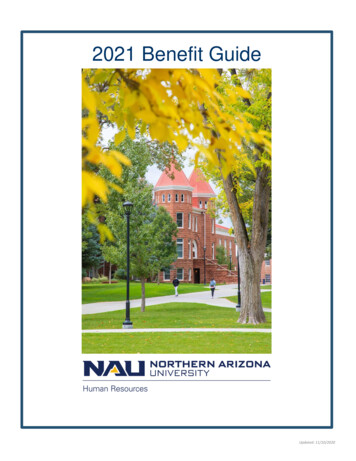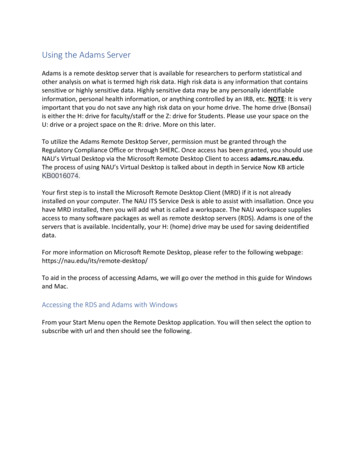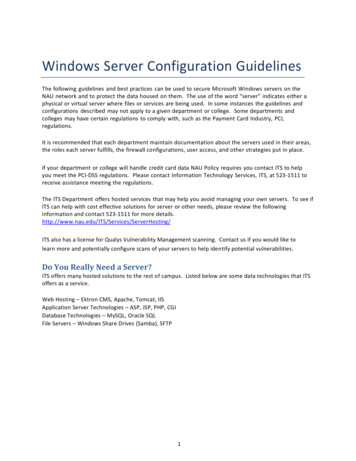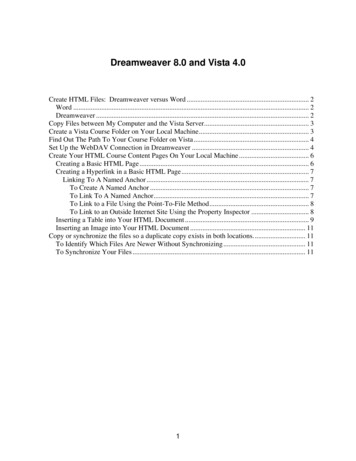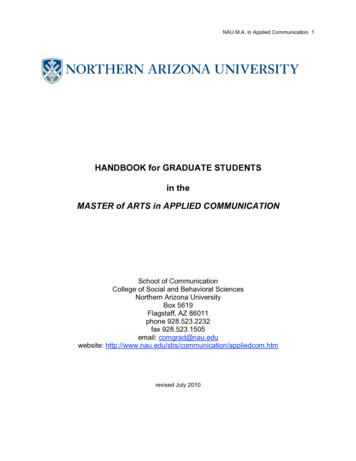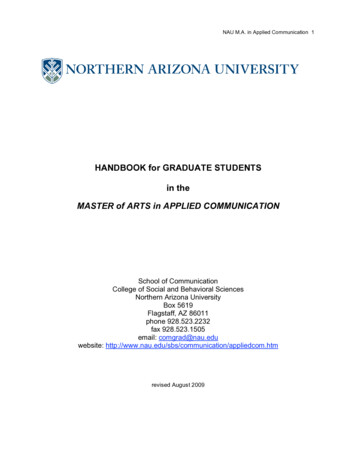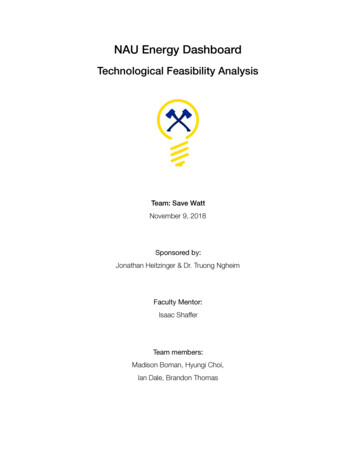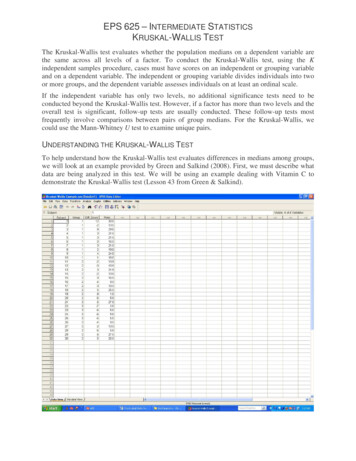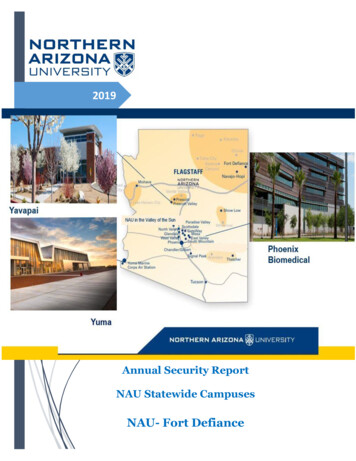
Transcription
2019Annual Security ReportNAU Statewide CampusesNAU- Fort Defiance
Annual Security ReportFall 2019NAU Statewide CampusesNAU- Fort DefianceEpiscopal Church in Navajo LandGood Shepard MissionWestchester BuildingFort Defiance, AZNAU Statewide Campuses occupies administrative space for full-time staff and rentsclassroom space as needed.Office Hours:Monday–Friday, 8:00 a.m.–5:00 p.m.OVERVIEWThe American Indian Nursing Program at NAU School of Nursing is the first and onlyreservation-based entry-level baccalaureate nursing program. Since its beginning in1996, more than 150 American Indian nurses have entered into practice as licensed RN'sserving health care needs of native peoples in reservation settings and adjacentcommunities.Currently housed at the Good Shepherd Mission in Fort Defiance, Arizona, studentshave class-room and clinical experience in our facilities and local tribal health careagencies. Through the program students have classroom and clinical experiences at FortDefiance, in Flagstaff at the mountain campus, in tribal health care agencies, in IndianHealth Service facilities, and hospital and community locations adjacent to the NavajoNation.PREPARING THE CLERY ANNUAL SECURITY REPORTThe Director of Clery Compliance at the Northern Arizona University PoliceDepartment, (NAU NPD) prepares and publishes the Clery Annual Security Report(ASR) in collaboration with numerous University departments. The purpose of thereport is to provide information about safety and security on campus to includeinformation on: crime statistics, policies and procedures, and personal safety.Information on security and crime prevention and awareness programs and some of theresources that are available is also listed. The programs and resources provided at theFlagstaff mountain campus are available to students and employees as applicable.Reporting options for victims of crime are provided within this report along with
information on victim assistance services. Members of the campus community areencouraged to use this ASR as a guide to safe practices on and off campus as well as aresource.The campus crime, arrest and referral statistics contained in this report include thosereported to campus security authorities to include the Office of the Dean of Studentsand NAU Statewide Campuses. The statistics also include those compiled from lawenforcement agencies in jurisdictions where Northern Arizona University owns, leases,or controls property or those with jurisdiction on adjacent property.Prior to October 1st of each year, notification of the availability of the ASR is sent to allstudents, faculty and staff along with a direct link to the report. The report can also befound on the NAU PD’s website at www.nau.edu/police. Printed copies of the report canbe requested by contacting the NAU PD Records Division at 928- 523-8884, or byvisiting the NAU PD at 525 East Pine Knoll Drive, Flagstaff, AZ.CAMPUS LAW ENFORCEMENT AUTHORITYThe Navajo Nation Police (formerly known as the Navajo Tribal Police) is the lawenforcement agency on the Navajo Nation in the Southwestern United States. It is underthe Navajo Division of Public Safety. There are also several substations in each districtranging from one-man substations or up to five officers each. Currently, there are 210sworn police officers (134 patrol), 28 criminal investigators and 279 civilians, acting assupport staff for the department There are approximately 1.9% police officers per 1,000people and one officer is responsible for patrolling 70 square miles (180 km2) ofreservation land. The Navajo Nation Police are funded by federal contracts and grantsand general Navajo Nation funds.Northern Arizona University does not have any officiallyrecognized student organizations with off- campuslocations at this site.HOW TO REPORT CRIMINAL OFFENSESNorthern Arizona University encourages accurate and promptreporting of all crimes occurring on this campus to the NavajoNation Police Department (NNPD). If a crime occurs offcampus, it should be reported to the appropriate law enforcement agency withjurisdiction. When the victim of a crime elects to, they are strongly encouraged topromptly and accurately report all criminal incidents. Knowledgeable parties areencouraged to report crimes against victims who are incapable of doing sothemselves.EmergenciesNon-Emergencies911(928) 871-6116
CAMPUS SECURITY AUTHORITIESNorthern Arizona University recognizes that although the University would like allcriminal incidents to be reported to law enforcement, victims sometimes tell someoneother than the police. For instance, a victim may turn to a coach or an advisor followingan incident. Individuals with significant responsibility for student and campus activitiesare considered to be a Campus Security Authority (CSA). Under the Clery Act, crimesare considered reported when they are brought to the attention of a CSA. When a CSAreceives information about a Clery reportable crime that is believed to have beenprovided in good faith, the CSA should document the incident and submit a report to theNAU PD.The role of the CSA is not to apprehend alleged perpetrators or conduct investigations.CSAs also are not responsible for trying to convince a victim to contact the police if thevictim does not choose to do so. CSAs, however, do have a reporting responsibility. Thereports enable any on-going threats to the community to be assessed and for theincidents to be included in the reported crimes for the University. The NAU PD has anon-line reporting option specifically for Campus Security Authorities through the NAUPD website at www.nau.edu/police.DAILY CRIME LOGNo Daily Crime Log is kept on campus.TIMELY WARNINGSIn the event that a situation arises either on the NAU- Fort Defiance campus or in itsvicinity that the NAU Local Coordinator determines threatens the well-being ofstudents, an email will be sent from the Local Coordinator to students’ official NAUemail address. The Local Coordinator can also communicate with students by telephoneif students have registered a contact phone number with NAU. If appropriate, the LocalCoordinator will also post notices on classroom doors used by NAU students and on theNAU office door.Anyone with crime-related information that merits a timely warning should contact theNAU Local Coordinator:Phone: 928-871-2851Good Shepard Contacts: Administration- Office928-729-2322After Hours Emergency Contact770-313-8701If the Local Coordinator cannot be reached students can contact the Statewide CampusFlagstaff Office at 1-800-426-8315 or NAU Police Department 24 hours a day inFlagstaff at (928) 523-3000.
MISSING STUDENTSIf a member of the University community or any other person has reason to believe thata student who resides on-campus has been missing from campus for 24 hours, theyshould immediately notify the NNPD.The Navajo Nation Police Department will initiate a missing person reportand investigate in collaboration with the Office of the Dean of Students.As students apply for campus housing, each resident is requested as part of theirapplication to identify a contact person or persons whom the institution will notifywithin 24 hours of the NNPD determining that the student is missing. This contactinformation is confidential and accessible only to authorized campus officials who willnot disclose it except to law enforcement personnel in furtherance of a missing personinvestigation. For any un-emancipated student under the age of 18, the institution isalso required to notify a custodial parent or guardian within 24 hours of the NNPDdetermining that the student is missing.After investigating a missing person report, should the NNPD determine that thestudent can be designated a missing person, the Dean of Students or their designee willcontact the student’s designated emergency contact number no later than 24 hours afterthe student is determined to be missing, and (when the student is under 18 years of ageand not emancipated) will contact the student’s custodial parent or guardian.SECURITY AND ACCESS TO CAMPUS FACILITIESThe Good Shepard maintenance department maintains the buildings and grounds witha careful eye for safety and security. Staff regularly inspects campus facilities andpromptly makes repairs affecting safety and security. They respond to reports ofpotential safety and security hazards such as broken windows and locks. Students andstaff members are encouraged to call the maintenance department (505-612-9056) toreport any actual or potential safety or security hazards. Individuals residing on campusare urged to keep their doors locked. College classroom facilities are to remain lockedwhen not in use.ALCOHOL, ILLEGAL DRUGS, AND SUBSTANCE ABUSEDRUG FREE SCHOOLS AND CAMPUSESNorthern Arizona University is committed to providing a healthyeducational environment, consistent with University policies andfree from unlawful acts. In addition, NAU must certify compliancewith The Drug-Free Workplace Act (41 USCA 701), The Safe andDrug-Free Schools and Communities Act (20 USCA 7101), and TheDrug and Alcohol Abuse Prevention Regulations (34 CFR 86).The health and safety of students and employees is a concern toNAU. Not only can the abuse of alcohol and controlled substances seriously affect
health, it can impact the ability to work and study and may also put the safety and wellbeing of others at risk. The prevention of substance abuse is sought in several ways atNAU, to include encouraging the healthy use of leisure time through recreation andother activities. Additionally, a variety of workshops on topics such as healthy eatingand stress management are offered through Health Promotions. Wellness programsand workshops are regularly offered for employees through the Employee Assistanceand Wellness Office and include similar topics.Information regarding the prevention/intervention programs, health risks, Universitypolicies, and University and legal sanctions associated with alcohol and other drugabuse can be found in Appendix N of the Student Handbook and on the HumanResources web page. All students and employees are encouraged to review thesematerials in order to make educated and informed decisions related to alcohol anddrugs.UNIVERSITY POLICIES ON ALCOHOL AND DRUGS, INCLUDINGLEGAL SANCTIONS AND UNIVERSITY DISCIPLINARY ACTIONASSOCIATED WITH ALCOHOL AND DRUG USEThe Northern Arizona University Student Code of Conduct states that the followingconduct is not acceptable on campus or at any statewide campus location:Violations of Arizona Board of Regents or University rules governing alcohol, includingconsumption, distribution, unauthorized sale or possession of alcoholic beverages. Withregard to drugs, the NAU Student Code of Conduct states that the following conduct isnot acceptable on campus at any statewide campus location.Unauthorized use, sale, possession or distribution of any controlled substance or illegaldrug or possession of drug paraphernalia that would violate the law.Sanctions include expulsion from the University, suspension from the University,University probation, warnings, restricted access to University properties and othereducational sanctions. Further, the University may refer a student to appropriateauthorities for prosecution for alcohol and other drug abuse violations.In addition to sanctions, federal law (specifically the Family Educational Rights andPrivacy Act) permits the University to notify parents of any alcohol and other drugviolation occurring on-campus for students under the age of (21). NAU views parents asimportant partners in the education of students, thus the University may notify parentswhen their student has been involved in a serious or repeated alcohol or other drugviolation.Northern Arizona University personnel policies require that University employeesreport to work in a condition to perform their duties safely and efficiently in the interestof their co-workers and students, as well as themselves. The use of alcohol and illegaldrugs is prohibited during work hours at the University workplace, while occupyingUniversity vehicles, while on University business, during class time, on field trips andduring other educational activities, except where permitted by the Arizona Board ofRegents (ABOR) and/or the President or designee. University employees who violate
University policies regarding alcohol and other drug use will be subject to legalsanctions and/or University disciplinary action, up to and including termination.CRIMINAL OFFENSES AND ASSOCIATED PENALTIES INVOLVINGILLEGAL DRUGSARIZONA OFFENSES AND PENALTIESCriminal offenses and associated penalties involving illegal drugs can be found inChapters 34 and 34.1 of Title 13 of the Arizona Revised Statutes (ARS):https://www.azleg.gov/arsDetail/?title 13.The definitions associated with these drug statutes can be found at ARS 13-3401 andARS 13-3451. Each specific statute will list the corresponding penalty for that offense.FEDERAL PENALTIESInformation regarding federal offenses and penalties can be found on the DrugEnforcement Administration’s web c/index.htmlMEDICAL MARIJUANANorthern Arizona University prohibits the possession and use of marijuana on all of itscampuses, including University housing.Growing and using marijuana remains a crime under federal law, and federal legislationprohibits any institution of higher education that receives federal funding from allowingthe possession and use of marijuana. The University continues to enforce its currentpolicies regarding controlled substances and any students or employees who violateUniversity policy prohibiting the use or possession of illegal drugs on campus will besubject to disciplinary and criminal action.NAU- FORT DEFIANCE EMERGENCY NOTIFICATION, RESPONSE,AND EVACUATION PROCEDURESEMERGENCY NOTIFICATIONIn the event of an emergency on the NAU- Fort Defiance campus, NAU StatewideCampus staff and faculty located on site will communicate directly with students andstaff emergent information about their safety and necessary steps of appropriate actionto protect themselves.If it should become necessary to evacuate a building, it is important that you remaincalm, leave the building immediately, and exit in an orderly manner. The evacuationshould be conducted immediately upon hearing a fire alarm, or if directed verbally to do
so by Public Safety, Fire Department personnel, or college faculty or staff. Prior to anyemergency, determine exit routes and exit points in your area.EMERGENCY PREPAREDNESSInformation on what to do in a variety of emergency situations can be found on theUniversity’s Emergency Information website: www.nau.edu/ready .This websiteprovides guidance on a variety of scenarios, as well as access to a number of otherresources, plans, and procedures relative to the University’s emergency preparedness.Students should check with administration personnel on the Fort Defiance campus inadvance of an emergency to review the emergency plans.EMERGENCY EVACUATIONEmergency plans and drills are necessary for all facilities to help ensure a safe, effective,and efficient evacuation. Full cooperation in any evacuation is required for the safety ofall involved.SHELTER IN PLACE/HIDE OUTIf an incident occurs and the buildings or areas around you become unstable or the airoutdoors becomes dangerous due to smoke or toxic or irritating substances, it may besafer to stay indoors rather than be exposed to the danger by attempting to leave. Theterm “shelter in place” means to stay in the building you are in until you are advised it issafe to come out. If your building is damaged, seek shelter in the nearest Universitybuilding. When sheltering in place, shut and close all exterior doors and close and lockwindows; try to find an interior room without windows, preferably above ground; turnoff all air conditions, heaters, and fans; close vents to ventilations systems; makeyourself comfortable. When approached by responding emergency personnel, followtheir directions. In the event of a hostile event on campus (e.g. an active shooter),community members may be advised to shelter in place or “hide out”. Should the needever arise, unless instructed otherwise; hide from view, lock and barricade doors, coverwindows, turn off lights, silence cell phones, if with others spread out throughout theroom, make an action plan, and call 911. Believe you will survive. When approached byemergency personnel, keep hands raised and fingers spread and follow all directions.For information and training on active shooter, emergency procedures, and strategies toenhance safety and security, contact the NAU PD at 928-523-3611 or emailASKNAUPD@nau.edu.CAMPUS SECURITY AND CRIME PREVENTION PROGRAMSNorthern Arizona University believes that it is better to act early to prevent crime ratherthan react to it after it has been committed. Ultimately, we are all responsible for ourown safety/security and the safety/security of those around us. Members of thestatewide campuses are encouraged to participate in and be aware of the crimeprevention programs that are available to them at their host sites. Additionally, thefollowing program is available on-line for all students and employees:
360 Stay Safe ; Strategies to Enhance Safety and Security: Provides a seriesof video lessons for students and employees offering safety strategies that relate to aUniversity environment. Topics include: Protecting your Possessions and Identity;Sexual Assault; Controlling Behavior; Stalking; Every Day Safety; Common-SenseDefense; and Safe Travel. The videos can be viewed by individuals and accessed at anytime with a valid NAU computer network login through the Campus Safety webpage atwww.nau.edu/campus-safety. These videos are also used in conjunction with guideddiscussion sessions or as a supplement to community presentations on enhancingpersonal safety and security.GENDER BASED VIOLENCE POLICIESNorthern Arizona University is committed to creating and maintaining a universityenvironment free from gender discrimination and violence. Throughout this documentthe term gender violence is defined to include sexual assault, domestic violence, datingviolence and stalking. NAU prohibits these offenses and reaffirms its commitment tomaintain a campus environment emphasizing the dignity and worth of all members ofthe university community. As a result, NAU issues this statement of policy to inform thecommunity of our comprehensive efforts to educate, inform and respond to genderviolence. Please utilize the below links to review NAU’s policies governing gender baseddiscrimination and violence:NAU policy regarding Prohibited Discrimination, Harassment, and Other InappropriateBehaviors:Equity and Access (SWALE) PolicyNAU Code of ConductStudent Disciplinary ProceduresStudent Sexual or Gender-Based Harassment and Sexual Misconduct PolicyStudent Sexual or Gender-Based Harassment and Sexual Misconduct ProceduresEDUCATION AND PREVENTION PROGRAMSNAU has a variety of educational programs to promote the awareness of domesticviolence, dating violence, sexual assault, and stalking, with a number of departmentsand groups teaching community members about sexual assault and relationshipviolence, encouraging healthy relationships and advocating safe dating and socialbehaviors. The university engages in programming and awareness campaigns intendedto prevent dating violence, domestic violence, sexual assault and stalking. Primaryprevention and awareness programs are offered for all incoming students and newemployees, and ongoing prevention and awareness campaigns are also offered to theentire university community. Educational programs and campaigns are responsive tocommunity needs, and assessed for value, effectiveness, or outcome.
The university’s programs and campaigns: Identify domestic violence, dating violence, sexual assault and stalking asprohibited offenses by the university; Define domesti
NAU Statewide Campuses occupies administrative space for full-time staff and rents classroom space as needed. Office Hours: Monday–Friday, 8:00 a.m.–5:00 p.m. OVERVIEW The American Indian Nursing Program at NAU School of Nursing is the first and only reservation-based entry-level baccalaureate
